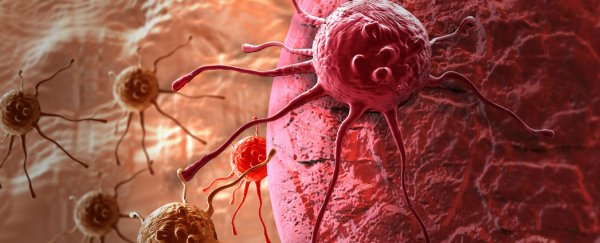Researchers in the US have come up with a new way of fighting aggressive melanomas using the twin defences of the body's own immune system, and it's halted the growth of a very aggressive form of melanoma in up to 90 percent of the mice tested.
Using a technique known as cancer immunotherapy, the team from MIT figured out how to activate the body's immune response by siccing antibodies on a tumour, while at the same time stimulating the T cells to train the immune system to respond to future attacks. Researchers in the past have tried to develop viable treatments using either antibodies or T cells, but none have seen the level of success that this team saw when they combined the two modes of attack and used them simultaneously.
"An anti-tumour antibody can improve adoptive T cell therapy to a surprising extent," one of the team, chemical engineer Dane Wittrup, said in a press release. "These two different parts of the immune therapy are interdependent and synergistic."
Drugs such as rituximab and Herceptin are used to stimulate the body's antibodies, prompting them to bind to cancer proteins and halt the signals that allow them to divide and multiply. At the same time, the antibodies are thought to activate the body's immune response to kill the tumour cells that have already formed. And adoptive T cell therapy involves removing billions of T cells from the patient, programming them to attack a specific tumour molecule, and then returning them to the blood stream.
In order to activate both responses at the same time, the team at MIT looked into a signalling molecule called Interleukin 2 (IL-2), which is known to boost the body's immune response, but has until recently only shown success in a petri dish. "Previous lab studies showed that the molecule was capable of significantly improving the effectiveness of natural killer cells in fighting cancer cells," says Chris Wood at Gizmag, "but it proved far less efficient in the bloodstream, where the kidneys would filter out the molecule within hours - long before it had the chance to work its magic."
So Wittrup and his colleagues fused IL-2 to an antibody molecule, which allowed it to piggy-back its way through the bloodstream for much longer, without being filtered out. When administered with antibody drugs once a week, IL-2 was able to halt the growth of a very aggressive form of melanoma in lab mice.
"The antibody-driven innate response creates an environment such that when the T cells come in, they can kill the tumour. In its absence, the tumour cells establish an environment where the T cells don't work very well," Wittrup said.
The results have been published in the journal Cancer Cell, and were described in the MIT press release:
"When they delivered an antibody, IL-2, and T cells targeted to the tumour, the adoptively transferred T cells killed cancer cells much more successfully than when only T cells were delivered. In 80 to 90 percent of the mice, tumours disappeared completely; even when tumour cells were reinjected into the mice months after the original treatment, their immune systems destroyed the cells, preventing new tumours from forming."
The team will continue experimenting with different types of antibody molecules to see which is the most effective for carting IL-2 around the bloodstream. If they're successful, we'll hopefully see human trials in the coming years.
Source: Gizmag
